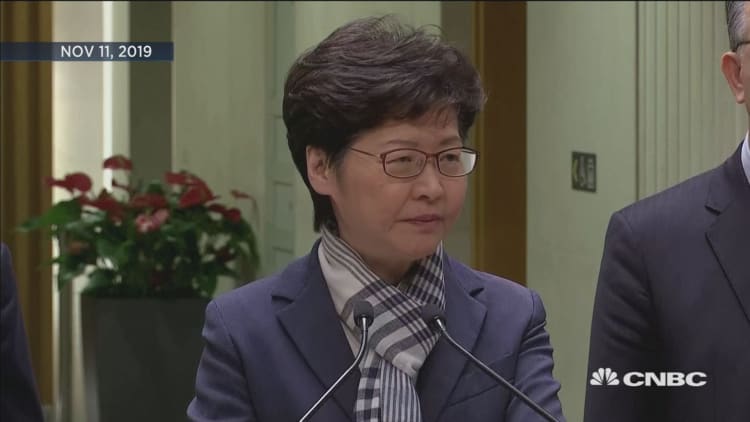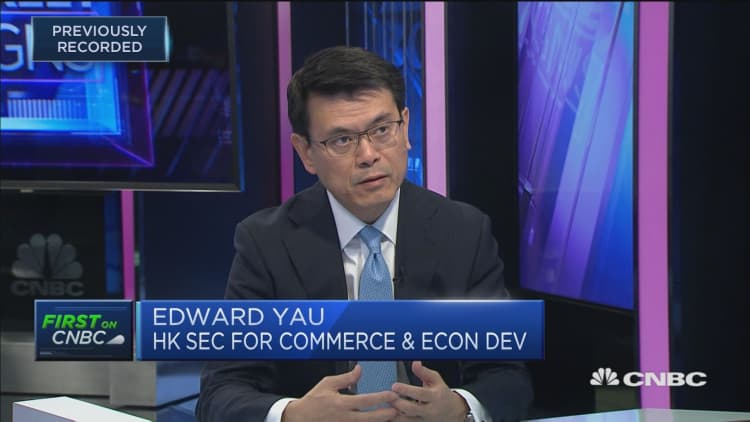
Hong Kongers marched again on Sunday, chanting "five demands, not one less" as the city's anti-government protests approached their six-month milestone.
Demonstrators have been locked in a stalemate with the local government since early June amid protests initially sparked by a bill that would have enabled extradition to mainland China. On June 9, a million people marched through the financial center to demonstrate their opposition. Approximately 2 million people marched in protest a week later.
While Hong Kong leader Carrie Lam has since retracted the bill, fulfilling one of the five demands, critics regarded the move as too little, too late. Social unrest in the city has since taken on broader anti-government sentiment as protesters push for greater democracy in Hong Kong.
Government opposition was fueled by anger with police conduct as well as how Lam's administration dealt with the protests, Ma Ngok, associate professor in the department of government and public administration at the Chinese University of Hong Kong, told CNBC.
"The government hasn't actually responded, so a lot of people think they just cannot give up on the protest" Ma said.
Compared with the 2014 protests, this year's uprising is a largely leaderless movement marked by greater violence and more forceful police tactics.
Police have arrested 4,319 people between June 9 and Nov. 14., according to government figures. Between June 9 and Nov. 26, the government said 2,600 injured people sought medical treatment at public hospitals. Media reports suggest that many injuries are not reported amid eroding trust in institutions.
Hostility hit new heights in November, including one particularly volatile day when police shot a 21-year-old demonstrator and protesters set a man on fire in separate incidents. Earlier in the month, a student died of his injuries after falling from a parking lot near a protest site.
To cap off November, police laid siege to two universities firing tear gas, trapping protesters inside. In return, protesters fired arrows and hurled molotov cocktails.
Hong Kong's economic troubles
The unrest adds further pressure on Hong Kong's economy, already hit by global uncertainty amid the U.S.-China trade war.
The city entered a technical recession in the third quarter, posting a year-over-year decline of 2.9%. The government estimated that the protests alone contributed 2 percentage points to the economic contraction.

The Hong Kong government introduced four rounds of relief measures worth 25 billion Hong Kong dollars ($3.19 billion), with most of that expected to go toward the hardest hit sectors like tourism and retail. That extra spending will lead the city to post its first budget deficit in 15 years, Hong Kong's financial secretary said.
The government lowered its full-year forecast and now expects Hong Kong's economy to contract 1.9% during this fiscal year. But business in Hong Kong remains largely normal, according to Edward Yau, Hong Kong's secretary for Commerce and Economic Development.
"We hope that, well with the easing of the social unrest, law and order back to normal. Then I think we're heading towards a rebound" Yau said in an interview with CNBC. "But more importantly, I think we also need to tackle the wider picture, which I think Hong Kong and our neighboring region also suffer, which is U.S.-China trade war."
Establishment's weak mandate
Lam, the city's leader, has insisted that escalating violence would not force her administration to yield to protester demands. Her popularity, however, has taken a drastic nosedive. Lam's approval rating plunged to just 19.7% in November, the lowest of Hong Kong's leaders, according to the most recent figures from the Hong Kong Public Opinion Research Institute.
Dissatisfaction with the city's government carried over into the district council elections last month. Pro-democracy candidates won in a landslide, as a record 2.94 million voters overwhelmingly rejected pro-establishment candidates.
Lam said her administration "respects the election results" and pledged to "listen to the opinions of members of the public humbly and seriously reflect." She also acknowledged that many "view that the results reflect people's dissatisfaction with the current situation and the deep-seated problems in society."
Even after a massive defeat for the pro-establishment, there's no sign that the protests will end any time soon.
"I think after the district council election it seems that it is obvious that it is not working. The strategy of the government is not working, so they need to try something else" said CUHK's Ma.
He suggested that more realistic solutions could include changing the city's current leadership and setting up an independent investigative commission on police conduct.
"It is possible that other concessions are on the cards but we will wait and see," he said.


